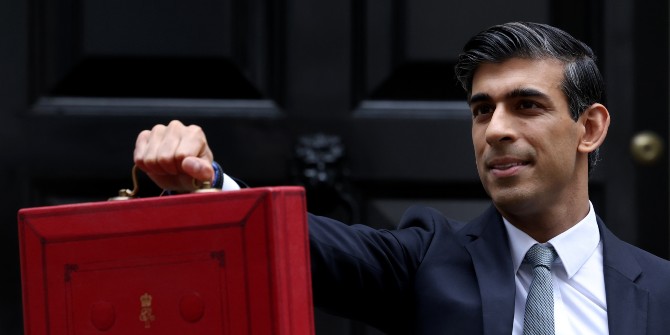The October 2021 Centre for Macroeconomics survey asked the members of its UK panel to evaluate the performance of UK fiscal rules to date and which rules would best serve the British economy going forward. The majority of the panel thinks the sequence of fiscal rules in place in the UK since 1997 has caused a material reduction in UK public debt. However, twice as many panellists thought these rules harmed the conduct of macroeconomic policy than those that thought they helped. Going forward, a majority of the panel believes that well-designed rules limiting public deficits or debts would best improve the conduct of macroeconomic policy – but nearly a third would scrap fiscal rules altogether, says Ethan Ilzetzki (LSE).
A fiscal rule is a constraint self-imposed by a government, setting limits on its tax, spending, and borrowing policies. These typically take the form of limits to public deficits, debt, spending, or interest expenditure. Nearly 100 countries around the world had a fiscal rule in place by 2015. Fiscal policy is legislated through a political process and a large academic literature shows that politics may lead to more borrowing than is socially desirable.
The UK government began experimenting with fiscal rules in 1997, when the Labour government legislated that the current budget (the budget excluding public investment) would be balanced over the course of the business cycle. According to the rule, the national debt was to remain below 40%. The fiscal rule was suspended during the 2009-10 recession and successive governments have amended the rule. A 2011 legislation established the Office of Budget Responsibility (OBR), a non-departmental government body meant to provide independent analysis of the UK’s public finances, including the government’s compliance with its fiscal rules.
The most recent rule set by the current government in December 2019 reinstated the original aim of running a balanced budget on average, with this target to be met within three years. This was augmented with a cap on public investment (at no more than 3% of GDP) and a requirement that the government reassess its fiscal plans if debt interest payments exceeded 6% of revenue.
This fiscal rule was short-lived. The pandemic led to a suspension of fiscal rules and the government has largely taken an approach of benign neglect to the public debt and deficit. However, Chancellor Rishi Sunak announced a new fiscal framework, including a fiscal rule, in the 2021 Autumn Budget and Spending Review. The Chancellor recommitted to a balanced budget within three years, attempting to require public debt to begin falling by that date.

Fiscal rules are a relative consensus in British politics, with both parties currently supporting budgetary policy to follow a rule. Proponents point to the need to constrain politically motivated deficits. The IFS writes in its green budget that “well-designed fiscal rules could make it easier for governments to borrow for good reasons while making it hard to borrow for bad reasons”. Further, some fiscal space should be preserved to cope with rising expenses on healthcare and adult social care, due to ageing populations. Finally, inflation has been on the rise and some warn that high levels of public debt may lead to further inflation. The Resolution Foundation has turned to the experience of other countries for evidence that fiscal rules can help countries conduct a more countercyclical fiscal policy, i.e. increase deficits in recessions when they are most needed. However, the report notes that the fiscal rules in place in the UK have had limited success and require reform.
In contrast, the FT editorial board criticised the proclivity of each successive government to enact a different type of rule, belying the notion of a ‘rule’ and providing little credibility: “Constant changes undermine the framework and suggest the rules are nothing more than a means of codifying the current stance of the chancellor rather than a reasoned approach to fiscal policy”.
Further, the economic shocks of the past decade showed that the best laid plans may last only briefly, until the next crisis. The editorial board also claimed the fiscal rules to be proposed in the fall budget are more austere than in the past. This coincides with Jonathan Portes’ and Simon Wren-Lewis’ warning that targeting debt levels risks excessively rapid adjustment and a rule governing deficits is preferable. NIESR goes further, calling on the government to scrap fiscal rules entirely. Instead, in the face of radical uncertainty, they have called on policy to be more discretionary and try to map out contingency plans for a variety of scenarios that might be laid out by the OBR (see the full five principles here).
This month’s Centre for Macroeconomics (CfM) survey asks the panel to evaluate how effective fiscal rules have been and what type of institutional arrangement is preferable going forward. The first two questions ask how the fiscal rules that have been in place since 1997 have affected the UK’s level of public debt and its economic performance.
Question 1: What impact has the sequence of fiscal rules adopted in the UK since 1997 had on the level of UK public debt?


Twenty-three panel members responded to this question. A majority of 57% of respondents believes that fiscal rules have reduced public debt, compared with 39% who think they have had no impact. No participants thought that the rules caused public debt to increase and no participants thought that the impact was great. Panellists thinking that fiscal rules had no impact were more confident in their responses, but the majority believes that fiscal rules constrained public debt even when weighting responses based on self-reported confidence levels.
Respondents thinking that fiscal rules limited public debt in the UK focussed on the period before 2008 in their explanations. David Miles (Imperial College) writes: “On balance the rules may have reduced debt somewhat. This is largely because the debt GDP ratio in the years before the 2008 financial crisis were held at around the 40% limit the rules then specified.” Roger Farmer (University of Warwick) adds that “[t]he fact that the debt was in the public discussion probably influenced spending. The National Institute makes a good case for flexibility.” Morten Ravn (University College London) pointed to the international experience with fiscal rules to justify his response: “Looking broadly at the experiences with fiscal rules in many countries is that they tend to have limited debt creation regardless of whether they are debt rules or deficit rules. I think the reasons is that they make it harder for governments to engage in debt creation even if the rules are there for politicians to change.”
Michael Wickens (Cardiff Business School and University of York) agrees that “[f]iscal rules stabilised UK public debt until 2001 as the Labour government followed Conservative policies,” but claims that they have had little impact on the level of public debt overall. He writes: “two crises led to the abandonment of any pretence at following fiscal rules. In 2008 the financial crisis led to a huge explosion. Again in 2020 Covid led to a huge increase in debt.”
Jagjit Chadha (National Institute of Economic and Social Research) is even more forceful in dismissing fiscal rules to date as acting as a bureaucratic device to limit expenditure in government departments and meet an adding up constraint in expectation. But shocks, news and political preferences have been the main driver of the level of public debt:
The rules have been changed so regularly nobody outside of government thinks they place a constraint on policy over and above what HM Treasury would have chosen anyway.
The second question asks the same question regarding macroeconomic performance.
Question 2: What impact has the sequence of fiscal rules adopted in the UK since 1997 had on the conduct of fiscal policy in the UK?


Twenty-three members of the panel answered this question. Thirty-nine percent of respondents think that fiscal rules have harmed UK macroeconomic performance. This compares with 21% who responded that fiscal rules improved UK macroeconomic performance. Thirty-five percent of the panel believes that fiscal rules had little impact on macroeconomic policy in the UK.
The era of austerity policies in the aftermath of the global financial crisis were a main argument against fiscal rules. Simon Wren-Lewis (University of Oxford) frames the argument thus: “Following the [Global Financial Crisis], rules were used to impose fiscal contraction on the economy when fiscal stimulus was required, and that did great harm, probably leading to a permanent loss in UK output.” Angus Armstrong (Rebuilding Macroeconomics, Institute for Global Prosperity, University College London) agrees that “the rules have relied on some dreadful macroeconomic ideas – such as the long run of the economy is somehow tied-down by some ‘given’ or fixed long run potential growth rate which has embedded fiscal conservatism when this was least appropriate. This reflects the limits of conventional thinking about what drives long term productivity and prosperity rather than the veracity of having rules per se.” Michael Wickens posits a diametrically opposed view, whereby it was the laxity of application of fiscal rules that have led to an unsustainable fiscal situation with “the prospect of higher inflation, higher interest rates and higher debt service payments”.
Other respondents were more positive about the role that fiscal rules have played. James Smith (Resolution Foundation) points to the overall improvement in fiscal institutions in the UK:
The combination of an independent OBR and clear fiscal rules has improved the conduct of fiscal policy in the UK markedly.
Ricardo Reis (LSE) agrees and points to evidence from the IMF: “Fiscal rules usually strengthen the credibility of public finances, raising fiscal space and lowering the chances of a debt crisis. Given the shocks and state of public finances during 2010-12, I would expect these average effects to have been particularly relevant for the UK.”
The third question looks forward and asks what a fiscal rule should target. Some respondents would naturally wish to have multiple targets, but were asked to list the single target that would do the most to improve macroeconomic policy in the UK.
Question 3: Which of the following variables should fiscal rules target to best improve the performance of UK macroeconomic policy going forward?


Twenty-two members of the panel responded to this question. The most common answer (41% of the panel) was that a limit to public deficit was the most preferable fiscal target. An additional 18% called for a target for public debt and 5% for a debt-interest-to-public-revenue target. In their written responses, many panellists expressed support for some combination of these measures. Twenty-seven percent of the panel called for no explicit target.
Roger Farmer expresses the view of the plurality in stating that “[k]eeping the primary deficit under control is the most important component of a sound fiscal policy.” While Simon Wren-Lewis voiced concern about the application of fiscal rules in practice, he argues that “rules should have current deficit targets for five years ahead on a rolling basis, with the actual value of the target determined by views about long run debt and a green new deal.”
However, he and others have called for flexibility and allows for multiple escape clauses in his approach: “The key lesson of earlier fiscal rules is that you have to allow room for fiscal stimulus when interest rates hit their lower bound… it is better to have no fiscal rule at all than have a rule that doesn’t allow for fiscal stimulus at the interest rate lower bound. Equally fiscal rules should never inhibit green investment, or low income compensation for high carbon taxes.” Many respondents support the current approach of exempting public investment from fiscal rules.
On the other side of the argument, Chadha argues that “[w]e need to remember that fiscal policy is an instrument of policy, like Bank Rate, and therefore should not be subject to a binding target. The target of policy should rather be related to some measurable aspect of the society’s social welfare function.” Armstrong goes further in calls for a rethinking of the objectives of fiscal policy:
To best improve the UK macroeconomic performance fiscal policy ought to aim at a socially inclusive economic objective — such as ensuring that labour and all other resources can be fully mobilised, now and in the future, in the pursuit of wellbeing in thriving communities. To operationalise this objective requires some new measurement such as sustainability, agency and inclusion as well as traditional measure of economic activity. These metrics ought to be the aim of fiscal policy.
This post represents the views of the author and not those of the COVID-19 blog, nor LSE. It first appeared at VOXEU.org and has been slightly updated.





